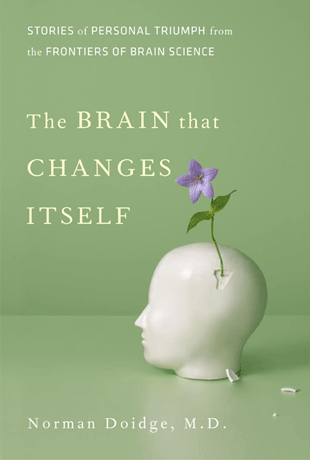Just finished “The brain that changes itself” of Norman Doidge which discuss new developments in brain research. Mainly the findings that brains can adapt to lost functions. Many examples are discussed of people who lost brain function due to stroke, or had only half a brain, and were able to train other parts of the brain to take over functionality.
What has this to do with institutional diversity?
In the last few years there is a lot of research on detecting areas of the brain that correlate with cooperative behavior in social dilemmas. But what if brain functions are not all genetic but in important ways wired due to repeated activities. The example of brain washing of children in North Korea is discussed in the book where children are confronted the whole day with propaganda material on adoration of the leaders and defining other nations as enemies, including in arithmetic exercises. In this way children are wired with “cultural norms” which will be difficult to unwire. Hence habitual behavior and social norms might become wired during childhood. Rewiring the brain will require persistent and repeated training of other areas of the brain. This might be possible for people who like to function after hit by a stroke, but it is less likely to expect to be plausible or desirable for changing habitual behavior. This again shows the importance of education in addressing the long term global challenges we are facing.











2 responses to “Plastic brains”
Plastic brains ! while I truly believe the plasticity of brian. It is also obvious that brain is only reversible to some degree. In other words plasticity has its own limits. In the classic book/works of Oliver Sachs An Anthropologist On Mars: Seven Paradoxical Tales . He presents examples of the Hippie, the blind man and the pontito artist, Each one of these shows how the brain may be not reversible after certain changes.
It is even more interesting to note that in case of the Pontito Artist the changes in the brain brain were caused by purely emotional upheavals, while in case of the Hippie the changes are rather more clinical and organic changes. However the case of the blind man is perhaps the most surprising one, in that it shows that being blind was rather state of mind that the brain adopted rather than physiological need (this is particularly tru after the blind man’s successful operation to restore his sight but yet his brains prefers to live as blind). Particularly in the case of the blind man, it is very clear that even reality is nothing but a preference perhaps a subconscious choice that the brain chooses over what others may see the preferable choice!.
So in relation to Plastic Brains, it arguable that the indoctrination (such as propaganda material on adoration of the leaders and defining other nations as enemies) can only be reversible to some extent. The impressions or affects of such indoctrination may become a truth believed by those subjected to it. In fact regardless of the truth it may just be a preferred choice of the individual and one that is re-enforced by the social norms that may be prevalent in that individuals immediate ambient/environment
I guess I intend to say that while plasticity of the brain is a potential for change it often is not what governs change. Rather many externalities and outside ambient influences are what govern how the individual chooses, reacts and transforms …………………………..consciously or otherwise!. (Plausible is it not?)
Abdul Ahmed III
Grad Student, ASU
Plastic brains ! while I truly believe the plasticity of brian. It is also obvious that brain is only reversible to some degree. In other words plasticity has its own limits. In the classic book/works of Oliver Sachs An Anthropologist On Mars: Seven Paradoxical Tales . He presents examples of the Hippie, the blind man and the pontito artist, Each one of these shows how the brain may be not reversible after certain changes.
It is even more interesting to note that in case of the Pontito Artist the changes in the brain brain were caused by purely emotional upheavals, while in case of the Hippie the changes are rather more clinical and organic changes. However the case of the blind man is perhaps the most surprising one, in that it shows that being blind was rather state of mind that the brain adopted rather than physiological need (this is particularly tru after the blind man’s successful operation to restore his sight but yet his brains prefers to live as blind). Particularly in the case of the blind man, it is very clear that even reality is nothing but a preference perhaps a subconscious choice that the brain chooses over what others may see the preferable choice!.
So in relation to Plastic Brains, it arguable that the indoctrination (such as propaganda material on adoration of the leaders and defining other nations as enemies) can only be reversible to some extent. The impressions or affects of such indoctrination may become a truth believed by those subjected to it. In fact regardless of the truth it may just be a preferred choice of the individual and one that is re-enforced by the social norms that may be prevalent in that individuals immediate ambient/environment
I guess I intend to say that while plasticity of the brain is a potential for change it often is not what governs change. Rather many externalities and outside ambient influences are what govern how the individual chooses, reacts and transforms …………………………..consciously or otherwise!. (Plausible is it not?)
Abdul Ahmed III
ASU